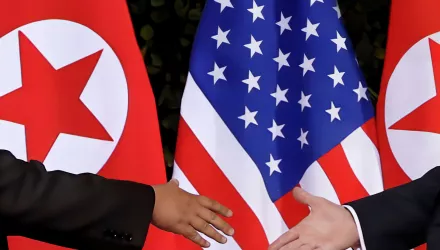Note
This op-ed originally appeared in Yediot Aharonot. It has been translated from Hebrew.
Unilateral disengagement from the West Bank has become the talk of the town and, if elected, Acting PM Ehud Olmert has even committed himself to carrying it out within four years. The corner stone of Israeli strategy, ever since the peace process began, the principle of reciprocity ("land for peace"), which gained broad international support, is now being replaced by what was previously considered the worst possible alternative, one that cannot ultimately resolve any of the fundamental aspects of the conflict. The general public despair over the Palestinians’ endless dysfunctionality and the dim prospects for resolving the conflict, as well as the desire to regain some control over our future, led to widespread support for the disengagement in Gaza and now in the West Bank, as well.
The disengagement from Gaza was formulated hastily, without ensuring an appropriate international quid pro quo, except from the U.S. A further move of this sort should be made contingent this time on the prior agreement and a significant quid quo pro from Europe and, to the extent possible, other countries such as the "moderate" Arab nations (Egypt, Jordan and Saudi Arabia), Russia and others. The international community generally objects to unilateral moves, but with the rise of Hamas, and faced with the alternative of stagnation and deterioration, it may be possible to garner its support. To this end Israel should initially display maximum political openness, including a willingness to negotiate with anyone, regardless of political affiliation, who is willing to adhere to the internationally accepted conditions (recognition of Israel, renunciation of terror and honoring of PLO commitments) and should adopt a constructive economic policy. A test period of this sort for Hamas will be viewed by the international community as a "just and wise" policy, will place the Palestinians’ in the position of rejectionists and will serve as the basis for international support for the planned move.
In return for disengaging from the West Bank, Israel should seek international acceptance of the following principles:
- Declaring the Palestinians in "breach" of the Roadmap and their participation in the peace process in "abeyance", as long as they do not meet the above terms.
- Recognition of the disengagement as the fulfillment of Israel’s commitments, pending a final accord, and of the vacated territories in Gaza and the West Bank as the "provisional" Palestinian state envisioned in the Roadmap.
- Recognition of the approach annunciated by President Bush, in his letter of April '04, i.e. that the final borders will reflect demographic realities and that the refugee problem can only be resolved within a future Palestinian state. These terms are accepted, in practice, even if not explicitly, by most of the international community. Furthermore, the Letter should be formalized in a format that would be binding on future administrations. A commitment should be sought for assistance in promoting the development of the Negev and Galilee, which will indirectly also help in the absorption of evacuees.
- Recognition of Israel's security needs after disengagement, including practical clarification of the international mantra, which ostensibly recognizes Israel's "right of self defense", but denies it in practice, every time Israel is required to defend itself.
- A significant upgrading of Israel’s relations with the EU, Egypt and Jordan and at the very least some improvement in relations with Saudi Arabia and others.
This approach, of prior strategic coordination with the U.S., Europe and parts of the international community, will turn the West Bank disengagement from a unilateral concession, which may be viewed by Palestinians and others as "another" retreat under pressure, into an overall strategic achievement.
The author is a former Deputy National Security Adviser and a Senior Fellow at Harvard's John F. Kennedy School of Government.
Freilich, Chuck. “Disengaging from the West Bank -- An Appropriate International Quid Pro Quo.” Yediot Aharonot, March 14, 2006





